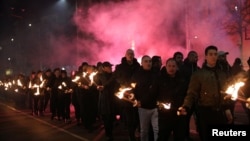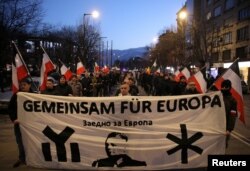More than 2,000 far-right activists from several European countries staged a torchlit procession through Sofia on Saturday to honor a Bulgarian pro-Nazi general, despite opposition from the Balkan country's political parties and Jewish groups.
The procession, known as the Lukov March after Hristo Lukov, who led the pro-Nazi Union of Bulgarian National Legions in the 1930s and early 1940s, went ahead after a court overturned the Sofia municipality's ban for a second consecutive year.
Participants, mostly young men in dark clothing, many bearing swastikas and making the Nazi salute, laid wreaths at the former home of Lukov amid heavy police security. Some activists had come from Germany, Sweden, Hungary and elsewhere.
"General Lukov was a valiant militant officer — a [World War I] hero who has inspired the revival of the Bulgarian army," said Zvezdomir Andonov, one of the march organizers.
Ahead of the march, hundreds of people took part in a counterprotest under the slogan "No Nazis on the streets."
Police reported no incidents during the protest or the march.
The World Jewish Congress, other Jewish groups and Bulgaria's political parties had called for the march to be suspended.
"It is absolutely abhorrent that in 2019 in Europe, the very place in which the Nazis attempted to wipe out the entire population of Jewish men, women and children, far-rightists continue to parade unfettered through the streets with
swastikas, SS symbols, and messages of hatred for Jews and other minorities," said WJC Executive Vice President Robert Singer.
Lukov's Union, active from 1932 to 1944, espoused anti-Semitism, anti-communism and a one-party state.
Lukov served as Bulgaria's minister of war from 1935 to 1938, fostering close ties with senior Nazi officials in Germany. He also pushed through a law modeled on the 1935 Nuremberg Laws in Germany that stripped Jews of their civic rights.
Lukov was assassinated by Communist partisans in 1943.
Bulgaria fought in World War II on Germany's side, though the government of King Boris III refused Adolf Hitler's demand to deport the country's Jews to death camps in Nazi-occupied Poland and elsewhere. This meant most of Bulgaria's Jews did not perish in the Holocaust and survived the war.








